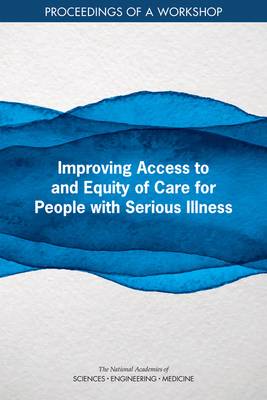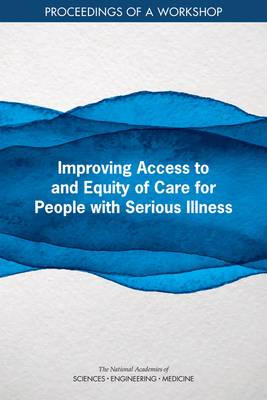
- Afhalen na 1 uur in een winkel met voorraad
- Gratis thuislevering in België vanaf € 30
- Ruim aanbod met 7 miljoen producten
- Afhalen na 1 uur in een winkel met voorraad
- Gratis thuislevering in België vanaf € 30
- Ruim aanbod met 7 miljoen producten
Improving Access to and Equity of Care for People with Serious Illness
Proceedings of a Workshop
National Academies of Sciences Engineering and Medicine, Health and Medicine Division, Board on Health Sciences Policy, Board on Health Care Services, Roundtable on Quality Care for People with Serious IllnessOmschrijving
The Centers for Disease Control and Prevention estimates that approximately 40 million people in the United States suffer from a serious illness that limits their daily activities. These illnesses include heart and lung disease, cancer, diabetes, and Alzheimer's disease and other forms of dementia. However, significant disparities exist across different communities in the quality and access to care for these illnesses. Factors such as race, ethnicity, gender, geography, socioeconomic status, or insurance status exacerbate these complex disparities. It is critical to reevaluate the current models of care delivery across diverse communities and vulnerable populations.
On April 4, 2019, The National Academies of Sciences, Engineering, and Medicine convened a workshop to investigate barriers, policy initiatives, and opportunities for improving access to and equity of care for people living with a serious illness. Discussions explored the current climate of health care and opportunities to improve access to care using organizational, community, patient and family, and clinician perspectives. This publication summarizes the discussions and presentations from the workshop.
Specificaties
Betrokkenen
- Auteur(s):
- Uitgeverij:
Inhoud
- Aantal bladzijden:
- 106
- Taal:
- Engels
Eigenschappen
- Productcode (EAN):
- 9780309495899
- Verschijningsdatum:
- 6/12/2019
- Uitvoering:
- Paperback
- Formaat:
- Trade paperback (VS)
- Afmetingen:
- 152 mm x 226 mm
- Gewicht:
- 158 g

Alleen bij Standaard Boekhandel
Beoordelingen
We publiceren alleen reviews die voldoen aan de voorwaarden voor reviews. Bekijk onze voorwaarden voor reviews.











